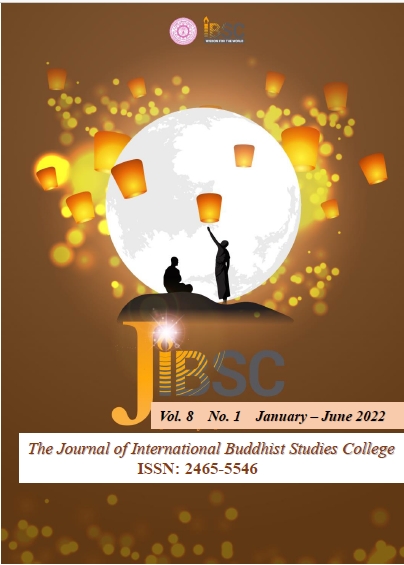Creating of just peace in Thai society: An integrated study of Buddhist justice in Theravada Buddhism as exposed by Somdet Phra Buddhaghosācariya (P.A. Payutto)’s writing and the legal justice in the philosophy of natural law
Main Article Content
Abstract
This research aims to explore the integration of Buddhist justice, as articulated by Somdet Phra Buddhaghosācariya (P.A. Payutto), with legal justice grounded in the philosophy of natural law to foster just peace in Thai society. The study has three primary objectives: (1) 1) to study the legal justice in the philosophy of natural law (2) to study of Buddhist justice in Theravada Buddhism as exposed by Somdet Phra Buddhaghosācariya (P. A. Payutto)’s writing, and (3) to develop a model for just peace in Thai society by synthesizing these two forms of justice.
Somdet Phra Buddhaghosācariya emphasizes that law must be rooted in Dhamma - righteousness and truth as explained by Hetu and Paccaya or Paṭiccasamuppāda (Dependent Origination). In Pāli, natural law is referred to as Niyāma, which is divided into five categories: Utu Niyāma (physical laws), Bija Niyāma (biological laws), Citta Niyāma (psychological laws), Kamma Niyāma (moral laws related to actions and their consequences), and Dhamma Niyāma (the laws of Dhamma). Of these, Kamma Niyāma is directly related to human behavior and plays a crucial role in promoting peaceful coexistence in society.
The research highlights that societal peace is maintained through Vinaya—laws and regulations that, although created by humans, must be grounded in Dhamma. Dhamma serves as the foundation for Vinaya, influencing the justice system in three key areas: (1) legislation, which should be guided by principles such as Saṅgaha-vatthu (the four bases of social solidarity) and the five precepts; (2) execution, which should be informed by Brahmavihāra (the four divine abodes) and impartiality; and (3) jurisdiction, which should also be aligned with Brahmavihāra and impartiality. Additionally, Kamma Niyāma, the five precepts, Saṅgaha-vatthu, and Sāraniyadham contribute to shaping the moral consciousness of individuals.
While Buddhist justice, as outlined in the Tipiṭaka, acknowledges the concepts of heaven and hell as consequences of one's actions, it is essential to establish Vinaya and laws based on Dhamma to ensure justice within society. The study posits that legal justice in natural law philosophy, often seen as divinely ordained, aligns with Buddhist justice, which is derived from human wisdom, and that these two can be integrated harmoniously.
For a deeper understanding of Dhamma and Niyāma, regular mindfulness practice is essential, leading to the cultivation of Sati (mindfulness), Khanti (patience), and Santi (peace). Such inner transformation enables the practical application of Dhamma, ultimately contributing to the establishment of just peace in Thai society.
Article Details
The Journal of TCI is licensed under a Creative Commons Attribution-NonCommercial-NoDerivatives 4.0 International (CC BY-NC-ND 4.0) licence unless otherwise stated. Please read our Policies page for more information on Open Access, copyright and permissions.
References
BALLOTPEDIA. Separation of powers the Administrative state. [online]. Source: https://ballotpedia.org/Separation_of_powers [19December2019].
Crisp, Roger, ed. Aristotle: nicomachean ethics. Cambridge University Press, 2014.
Cicero, Marcus Tullius. The republic and the laws. Oxford Paperbacks, 1998.
Cicero, Marcus Tullius. "Cicero: De re Publica (On the Republic), De Legibus (On the Laws) (Loeb Classical Library No. 213)." (1943).
Customs Department. Customs Act B.E 2469 and Customs Tariff Decree B.E 2530. Bangkok, 2017.
Harvey, Peter. (ed.). Common Buddhist text: Guidance and insight from the Buddha. Bangkok: Mahachulalongkornrajavidyalaya University Press, 2017.
Jowett, Benjamin. The republic. Courier Corporation, 2000.
Mahachulaongkornrajavidyalaya. Thai Tipitākas: Mahachulalongkornrajavid- yalaya Edition. Bangkok: Mahachulaongkornrajavidyalaya Press, 2539/1996.
Mautner, Thomas. Dictionary of Philosophy: The Language and Concepts of Philosophy Explained. England: Blackwell Publishers, 2005.
Meenakanit, Taweekiat. Society and Law, 5th ed. Bangkok: Duantula Press, 2016.
Phra Brahmagunabhorn (P.A. Payutto). Buddhadhamma, expanded. volume. 46th ed. Bangkok: Sahadhamig co, ltd Press, 2016.
Phra Brahmagunabhorn (P.A. Payutto). Dictionary of Buddhism. 34th ed., Phrabuddhasasana Dhammasapa. Bangkok: Press, 2016.
Phra Brahmagunabhorn (P.A. Payutto). If Dhammādhipateyya, Does not come, Democracy Will not Be found Out (Convergence: Political Science and Jurisprudence). 15th ed. Bangkok: Pimsuay co,ltd Press, 2016 .
Phra Brahmagunabhorn (P.A. Payutto). Jurisprudence with Buddhist Means. 14th ed.. Bangkok: Dhammasapa Press,2012.
Phra Dhammapitaka (P.A. Payutto). Hell - Heaven in Tipṭaka. Bangkok: Dhammasapa Press, 2004.
Phra Dhammapitaka (P.A. Payutto). Kamma and Hell, Heaven for New Generation. 3th ed. Bangkok: Dhammasapa Press, 2004
Phramaha Hansa Dhammahaso. Justice in terms of Buddhism. [online]. Source: http://www.ps.mcu.ac.th/?p=141 [19 December 2019].
Sawangsak, Charnchai. Explanation of Administrative Law, 27th ed., Bangkok: Duantula Press, 2018.
Somdet Phra Buddhakhosacāriya (P.A. Payutto). The Unheralded Value of the Vinaya: The Buddhist Teachings on Social Discipline. Bangkok: Phlidhamm Press, 2017.


